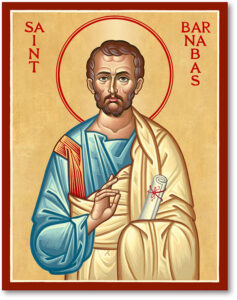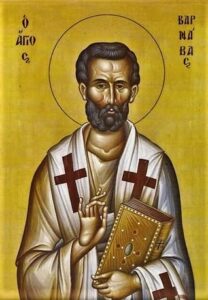St. Barnabas, Apostle, Set Apart by the Holy Spirit – June 11 I Son of Encouragement’ or ‘Son of Exhortation’

St. Barnabas was not one of the twelve chosen by the Lord, he is referred to as an apostle on account of the special commission he received from the Holy Spirit and his apostolic work. His original name was Joseph (Acts 4: 36), meaning Jehovah increases or God will add. He, like the Old Testament Righteous Joseph (Genesis 37, 39–50), wholeheartedly lived for God and sacrificially served His people. The apostles gave the name Barnabas (Acts 4: 36), meaning either ‘son of encouragement’ or ‘son of exhortation’. Possibly because he had and aptitude for offering consolation to his fellow believers in times of affliction and his giftedness in teaching others the truths of the gospel. The legacy of Barnabas not only also an apostle but included him being a prophet and teacher (Acts 13: 1). Barnabas stands out for his exceptional character qualities, especially true of being Jesus’ Apostle, though forgotten by many.
He was born in the Mediterranean island of Cyprus. He was a Jew of the dispersion, which refers to those forced out of Israel after various foreign conquests. He belonged tothe tribe of Levi. His Levite heritage meant he knew the Mosaic Law. Furthermore, Barnabas probably spoke Greek and was familiar with Gentile life and Hellenistic Judaism, thus was familiar with the religious customs practiced by Jews who spoke Greek and observed Greek culture.
Barnabas was kind and had a generous spirit, He maintained an openhanded attitude toward material wealth. Even though Levites traditionally lived off the temple system, Barnabas owned real estate, probably in Cyprus. He trusted in Jesus for salvation thus, Barnabas sold a field he owned and gave the money he received to the apostles (Acts 4: 37). Barnabas possessed exceptional spiritual qualities. His life was under the control of the Spirit, and Barnabas had an unshakable confidence in God.
Barnabas was a close associate of St. Paul. Initially, only Barnabas was willing to associate with Saul (Paul) after his conversion (Acts 9:26-27). Barnabas who took the converted Paul to meet, the other apostles in Jerusalem. Barnabas explained and testified that when Saul was in Damascus, he had evangelized courageously in the name of Jesus and also what the Lord had revealed Himself to Saul and spoken to him, in Damascus. The Apostles accepted what he said about Saul, because Barnabas was highly respected by the Christians in Jerusalem. Thus, Paul was able to associate freely with Jesus’ disciples and proclaim the gospel to the unsaved (Acts 9: 28). They were sent to Antioch and undertook the first missionary journey that began in Cyprus. It was in the city of Antioch the name ‘Christians’ was given to the followers of our Lord (Acts 11: 26). A little later the flourishing Church of Antioch raised money for the relief of the poor brethren in Judea during a famine. This they sent to the heads of the Church in Jerusalem with Paul and Barnabas. In Antioch, he was overjoyed to see the grace of God, he was glad, and he exhorted and encouraged the believers to remain faithful to the Lord with all their hearts (Acts 11: 22-24). Barnabas put others first, especially in providing encouragement and exhortation.
Barnabas was a good man, full of the Holy Spirit and of faith. Barnabas had the understanding and affirming nature required for making an honest appraisal of the flourishing Church ministry at Syrian Antioch, the third largest city in the Roman Empire, after Rome and Alexandria and a great many people were added to the Lord. Barnabas was one of the gifted prophets and teachers in the Church at Syrian Antioch (Acts 13:1). As they ministered to the Lord, and fasted, the Holy Spirit said, “Separate me Barnabas and Saul for the work whereunto I have called them.” And when the whole assembly had fasted and prayed, and laid their hands on them, they sent them away. So, being sent forth by the Holy Spirit, departed unto Seleucia; and from there they sailed to Cyprus (Acts 13: 2-4). Thus, during their missionary journey, Barnabas and Saul evangelized in Cyprus, as well as in Pisidian Antioch, Iconium, Lystra, and Derbe (Acts 13: 4–14: 20).
In Lystra there sat a man who was lame. He had been that way from birth and had never walked. He listened to Paul as he was speaking. Paul looked directly at him, saw that he had faith to be healed and called out, “Stand up on your feet!” At that, the man jumped up and began to walk. When the crowd saw what Paul had done, they shouted in the Lycaonian language, “The gods have come down to us in human form!” During this episode, a crowd at Lystra mistook Barnabas for Zeus and Paul for Hermes because he was the chief speaker (Acts 14: 12). The priest of Zeus and the crowd wanted to offer sacrifices to them. They had difficulty keeping the crowd from sacrificing to them. Then some Jews came from Antioch and Iconium and won the crowd over. They stoned Paul and dragged him outside the city, thinking he was dead.
God used Barnabas, along with Paul, to bring many Gentiles to faith in the Saviour. It is not difficult to imagine the excitement felt among the disciples in the Church at Antioch, especially as they heard the missionaries recall the wonderful things the Spirit accomplished through them (Acts 14: 26-27). Shortly afterwards a dispute arose in the Church of Antioch about the observance of Jewish rites, some maintaining in opposition to the opinion of St. Paul and St. Barnabas that pagans entering the Church must be circumcised as well as baptized. This led to the calling of a council at Jerusalem in A.D. 50. St. Paul and St. Barnabas gave a full account of their labours among the Gentiles. The council emphatically declared that Gentile converts were exempt from the obligation to be circumcised.

Barnabas, along with Paul, supported himself on his missionary excursions by earning a living (1 Cor. 9: 6). Fourteen years after Paul’s conversion, Barnabas, along with Titus (an uncircumcised Gentile Christian), accompanied Paul to Jerusalem (Gal. 2: 1). Barnabas and Paul had a sharp disagreement over whether to take John Mark (the cousin of Barnabas; Col. 4: 10) with them on a second missionary journey. Previously, during the first missionary journey, as the group began to evangelize in Perga, John Mark abandoned the team and returned to Jerusalem (Acts 12: 25; 13: 5, 13). Paul looked so dimly on this turn of events that he parted company with Barnabas over giving John Mark another chance. Consequently, while Barnabas returned to Cyprus with John Mark, Paul took Silas with him to evangelize Galatia (Acts 15: 36-41).
Barnabas focused on living wholeheartedly for God, especially in unselfish ministry to others. Barnabas understood that the effective spread of the gospel was centred in prayer. Barnabas invested his intellect and energy to bring relief to others who were afflicted. Barnabas recognized that serving as a disciple of Jesus and had his heart planted in the soil of God’s eternal kingdom. For Barnabas, the goal was bringing as many unsaved as possible to faith in the Son. Barnabas did not insist that other believers financially support him in his ministry endeavors but cared about how other believers perceived his beliefs and actions.

The Epistle of Barnabas carries his name, but its authorship is uncertain. He is said to have been martyred (stoned to death) at Salamis, the Cyprian Port in c. A.D. 61. Three feast days of St. Barnabas are observed in the Syrian Orthodox Church – June 11, May 11 and December 17. St. Barnabas is venerated as the Patron Saint of Cyprus.
0 Comments